 (Photo: Diego M. Radzinschi/ALM)
(Photo: Diego M. Radzinschi/ALM)Days Before Trial, Cadwalader and Redskins Owner Settle $22M Malpractice Case
The settlement avoids what would have been an extraordinarily high-profile trial for a legal malpractice suit.
September 26, 2018 at 08:01 AM
4 minute read
Just three days before a $22 million legal malpractice trial was to begin, Cadwalader Wickersham & Taft has settled with an investment entity run by Washington Redskins owner Daniel Snyder.
Late Tuesday night, attorneys for Cadwalader and Snyder-controlled Red Zone filed dismissal papers in Manhattan Supreme Court, citing a “confidential settlement agreement between the parties” that day. The case was settled and discontinued with prejudice, the parties said.
Red Zone was seeking more than $22 million in damages, including interest, against Cadwalader, represented by Cravath Swaine & Moore. The case, brought more than seven years ago, concerned advice Cadwalader gave on an investment bank's fee during a proxy fight at Six Flags Inc.
In settling, Cadwalader is cutting off what would have been an extraordinarily high-profile trial for a legal malpractice suit. According to court documents, Snyder was expected to testify, as was Dwight Schar, a part-owner of the Redskins, and David Pauken, a former chief operating officer for the team.
Other potential witnesses included Dennis Block, a former Cadwalader partner now at Greenberg Traurig, and William Mills, co-chair of Cadwalader's corporate group.
The parties' stipulated order of dismissal restricts the parties' discussion on the case, requiring that no party make any public statement about the settlement or the merits, other than to confirm the case was settled and discontinued.
The court papers were signed by Cadwalader's attorneys, David Marriott and Lauren Moskowitz, partners at Cravath, and Red Zone's attorney, New York solo practitioner Jeffrey Jannuzzo. The attorneys did not return emails about the settlement.
After some unfavorable court rulings this year for the law firm, Cadwalader in the last week sought the court's help in getting a mediator. On Friday, a week before trial was scheduled, Marriott, Cadwalader's attorney, told the judge that the parties had “recent” settlement discussions, but were unable to make progress.
In a Sept. 21 letter to Justice O. Peter Sherwood, Marriott asked the judge to appoint a neutral to conduct a mediation and to order the parties to appear with “decision makers with authority” present.
But the parties apparently had settlement talks outside this process. A source familiar with the case said the judge did not order mediation.
The case's allegations go back to 2005, when Red Zone pursued a proxy contest at Six Flags to replace three of its seven directors. Cadwalader had represented Red Zone on its dealings with Six Flags, with then-partner Block advising Snyder. Red Zone also hired UBS Securities as a financial adviser.
In its malpractice suit, Red Zone alleged Cadwalader was negligent in advising on an August 2005 amendment that was supposed to limit UBS' fees to $2 million, and as a result, UBS ended up winning a $10 million judgment against Red Zone for fees.
The trial was expected to examine Block's advice on the amendment. During the malpractice case, Block claimed he explained to Snyder that the August 2005 amendment could not be read to cap UBS' fee. “I recommended that Snyder not accept the UBS draft,” Block said in an affidavit. “After some further discussion, during which I reiterated my concerns about UBS' language to Snyder, Snyder made the decision to sign the draft as proposed by UBS and executed the amendment letter.”
But according to Red Zone, Snyder and other witnesses swore that no such warning ever happened.
Trial was finally scheduled to kick off Friday after years of legal wrangling and appeals. Red Zone initially won a judgment in 2014 against Cadwalader before then Manhattan Supreme Court Justice Melvin Schweitzer, which was affirmed by the Appellate Division, First Department. But in 2016, the state Court of Appeals modified the ruling, stating that triable issues of fact exist over whether Cadwalader exercised “ordinary reasonable skill and knowledge.”
This year, Sherwood denied certain defense arguments by Cadwalader and ruled that the law firm couldn't present expert witnesses, a blow to the firm's defense before trial.
READ MORE:
This content has been archived. It is available through our partners, LexisNexis® and Bloomberg Law.
To view this content, please continue to their sites.
Not a Lexis Subscriber?
Subscribe Now
Not a Bloomberg Law Subscriber?
Subscribe Now
NOT FOR REPRINT
© 2024 ALM Global, LLC, All Rights Reserved. Request academic re-use from www.copyright.com. All other uses, submit a request to [email protected]. For more information visit Asset & Logo Licensing.
You Might Like
View All
Elizabeth Cooper of Simpson Thacher on Building Teams in a 'Relationship Business'
4 minute read
Changes at the Top: How 'Different Leadership Skills' Are Prevailing in Big Law

After 2024's Regulatory Tsunami, Financial Services Firms Hope Storm Clouds Break
Trending Stories
- 1Topping Kirkland, Weil Won the Most Valuable Major Bankruptcy Retentions of 2024
- 2Judicial Ethics Opinion 24-89
- 3It's Time To Limit Non-Competes
- 4Jimmy Carter’s 1974 Law Day Speech: A Call for Lawyers To Do the Public Good
- 5Second Circuit Upholds $5M Judgment Against Trump in E. Jean Carroll Case
Who Got The Work
Michael G. Bongiorno, Andrew Scott Dulberg and Elizabeth E. Driscoll from Wilmer Cutler Pickering Hale and Dorr have stepped in to represent Symbotic Inc., an A.I.-enabled technology platform that focuses on increasing supply chain efficiency, and other defendants in a pending shareholder derivative lawsuit. The case, filed Oct. 2 in Massachusetts District Court by the Brown Law Firm on behalf of Stephen Austen, accuses certain officers and directors of misleading investors in regard to Symbotic's potential for margin growth by failing to disclose that the company was not equipped to timely deploy its systems or manage expenses through project delays. The case, assigned to U.S. District Judge Nathaniel M. Gorton, is 1:24-cv-12522, Austen v. Cohen et al.
Who Got The Work
Edmund Polubinski and Marie Killmond of Davis Polk & Wardwell have entered appearances for data platform software development company MongoDB and other defendants in a pending shareholder derivative lawsuit. The action, filed Oct. 7 in New York Southern District Court by the Brown Law Firm, accuses the company's directors and/or officers of falsely expressing confidence in the company’s restructuring of its sales incentive plan and downplaying the severity of decreases in its upfront commitments. The case is 1:24-cv-07594, Roy v. Ittycheria et al.
Who Got The Work
Amy O. Bruchs and Kurt F. Ellison of Michael Best & Friedrich have entered appearances for Epic Systems Corp. in a pending employment discrimination lawsuit. The suit was filed Sept. 7 in Wisconsin Western District Court by Levine Eisberner LLC and Siri & Glimstad on behalf of a project manager who claims that he was wrongfully terminated after applying for a religious exemption to the defendant's COVID-19 vaccine mandate. The case, assigned to U.S. Magistrate Judge Anita Marie Boor, is 3:24-cv-00630, Secker, Nathan v. Epic Systems Corporation.
Who Got The Work
David X. Sullivan, Thomas J. Finn and Gregory A. Hall from McCarter & English have entered appearances for Sunrun Installation Services in a pending civil rights lawsuit. The complaint was filed Sept. 4 in Connecticut District Court by attorney Robert M. Berke on behalf of former employee George Edward Steins, who was arrested and charged with employing an unregistered home improvement salesperson. The complaint alleges that had Sunrun informed the Connecticut Department of Consumer Protection that the plaintiff's employment had ended in 2017 and that he no longer held Sunrun's home improvement contractor license, he would not have been hit with charges, which were dismissed in May 2024. The case, assigned to U.S. District Judge Jeffrey A. Meyer, is 3:24-cv-01423, Steins v. Sunrun, Inc. et al.
Who Got The Work
Greenberg Traurig shareholder Joshua L. Raskin has entered an appearance for boohoo.com UK Ltd. in a pending patent infringement lawsuit. The suit, filed Sept. 3 in Texas Eastern District Court by Rozier Hardt McDonough on behalf of Alto Dynamics, asserts five patents related to an online shopping platform. The case, assigned to U.S. District Judge Rodney Gilstrap, is 2:24-cv-00719, Alto Dynamics, LLC v. boohoo.com UK Limited.
Featured Firms
Law Offices of Gary Martin Hays & Associates, P.C.
(470) 294-1674
Law Offices of Mark E. Salomone
(857) 444-6468
Smith & Hassler
(713) 739-1250







